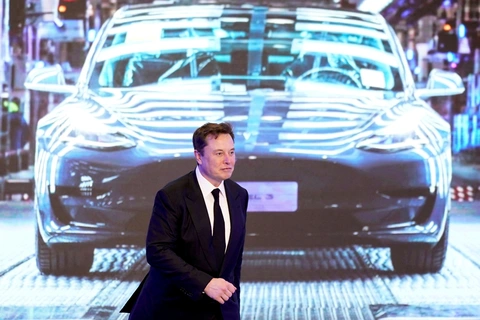Elon Musk is one of the most famous entrepreneurs in the world, known for his relentless drive to push humanity forward through technology. As the CEO of Tesla, SpaceX, and other groundbreaking ventures, he has transformed industries and reshaped global conversations about energy, transportation, and space exploration. Yet, despite being a father to many children, Musk openly worries that no one can succeed him in leading his empire.
This concern goes beyond family dynamics. It touches on questions of legacy, leadership, and the survival of his ambitious projects in the decades to come. Musk has built companies that depend heavily on his vision and personality. But what happens after him? Can one of his children step up, or must the business world look elsewhere?
Elon Musk’s Expanding Family
Elon Musk is not only a businessman but also a father. Over the years, he has welcomed multiple children, and he often expresses his strong belief in the importance of family and population growth. Musk has even spoken about the declining global birth rate as a threat to civilization, emphasizing the need for larger families.
With such a large family of his own, it might seem natural to assume that one of his children could eventually take over his companies. After all, dynasties are common in the business world — think of the Waltons with Walmart or the Murdochs with their media empire. But Musk himself appears uncertain about whether his children would ever be able, or even willing, to fill his shoes.
The reason is simple: Musk does not just run companies. He runs revolutions. His leadership style, his obsession with detail, and his ability to drive innovation are qualities that are difficult, perhaps impossible, to inherit.

The Problem of Succession
The issue of a successor to Elon Musk has become one of the most pressing concerns for Tesla, SpaceX, and the wider market. Investors and analysts worry about what would happen if Musk could no longer lead. His companies are heavily tied to his identity and vision. Unlike Apple, which transitioned smoothly from Steve Jobs to Tim Cook, Tesla and SpaceX do not yet have a clear second-in-command capable of leading at the same level.
Without a succession plan, Musk’s empire risks instability. Stock prices could plummet, projects could stall, and investor confidence could weaken. That is why discussions about Musk’s potential $1 trillion pay package have often included conditions related to succession planning. Boards and stakeholders want reassurance that these companies will survive beyond Musk himself.
Why Musk’s Children May Not Be the Answer
Despite having many children, Musk has never suggested that he expects them to succeed him. Unlike traditional family-owned businesses, Tesla and SpaceX are publicly traded or investor-backed companies that require professional leadership. Being Musk’s child does not automatically make one qualified to run some of the most technologically advanced corporations in the world.
Moreover, Musk’s vision and personality are unique. He is a workaholic, often sleeping at factories or launching rockets while simultaneously tweeting to millions of followers. He thrives on risk and has a rare ability to combine engineering detail with public showmanship. These traits are not easily passed down, even to family.
Musk himself may understand this better than anyone. That is why, despite being a proud father, he still fears that no one can succeed him, whether from within his family or outside of it.
Potential Leaders Inside Musk’s Companies
If not his children, then who? Some analysts point to leaders already within Musk’s companies.
At Tesla, executives like Tom Zhu, who oversaw the company’s success in China, have been mentioned as possible future leaders. At SpaceX, Gwynne Shotwell, the highly respected president and COO, is often described as Musk’s most capable deputy. She has played a crucial role in turning SpaceX into a profitable company with contracts from NASA and commercial clients.
Still, while these executives are brilliant managers, none carry the same charisma or public influence as Musk. Investors do not simply buy into Tesla cars or SpaceX rockets — they buy into the Elon Musk vision. This dependence makes succession even more complicated.
Investor Concerns About Leadership Transition
Investors are well aware of the risks tied to Musk’s dominance. Tesla’s stock price, for instance, often moves dramatically based on Musk’s comments or appearances. His influence on cryptocurrency markets shows how far his reach extends. For shareholders, the idea that no one could succeed Musk is unsettling.
This is why some argue that any compensation plan, including the rumored trillion-dollar package, must be tied to succession planning. Boards want Musk to identify and prepare someone who can take over in the long run. Without this, the future of these companies remains uncertain.
Musk’s Vision Outlives Musk Himself
Elon Musk is motivated by more than personal wealth. He frequently says his mission is to ensure humanity’s survival and progress. Whether it is colonizing Mars through SpaceX, achieving sustainable energy with Tesla, or advancing brain-machine interfaces with Neuralink, these are projects designed to outlast his own lifetime.
But here lies the contradiction: Musk has designed companies with goals spanning decades or centuries, yet their survival remains tied to one man. Without a successor, these long-term missions are at risk. Musk himself admits this tension, which is why he still fears the day when someone else must take over.
Public Fascination With Musk’s Family
The public often speculates about Musk’s children and their potential future roles. With such a famous father, it is natural to wonder whether they might one day lead Tesla or SpaceX. Yet Musk rarely discusses this possibility seriously. He speaks more about the importance of family and population than about grooming his children for leadership.
In this sense, Musk differs from traditional business dynasties. His empire is built less on family succession and more on technological disruption. This makes the succession problem harder to solve, but it also shows how Musk views his companies as missions rather than family inheritances.
The Legacy Question
At the heart of Musk’s fear is the question of legacy. What will happen to Tesla, SpaceX, and his other ventures after him? Will they collapse without his vision, or will they evolve into stable institutions capable of carrying out his mission?
Musk’s legacy depends on more than wealth. It depends on ensuring that his companies and ideas survive for generations. Naming and preparing a successor would be the ultimate act of leadership, turning his empire into something greater than himself.

Conclusion: Many Children, One Dilemma
Elon Musk may be a father to many children, but when it comes to succession, he still fears that no one can succeed him. His companies are too dependent on his unique vision, personality, and drive. For Tesla, SpaceX, and his other ventures to thrive in the long run, Musk must eventually confront this challenge.
The world has seen visionaries before, but few at Musk’s scale. The question of succession is not just about his businesses — it is about the future of innovation itself. Until Musk identifies a successor, his trillion-dollar empire remains at risk, no matter how many children carry his name.